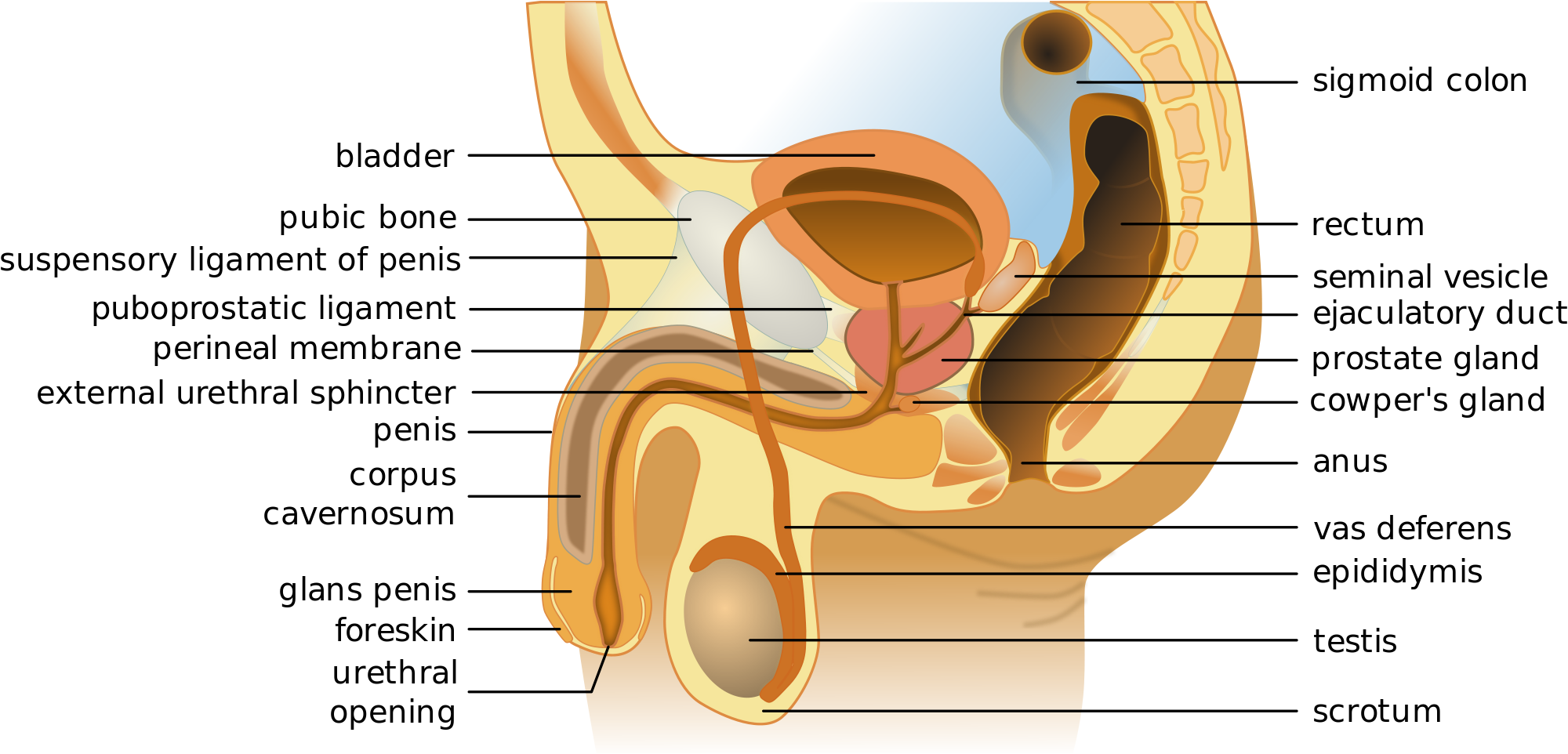Male Reproductive System
The male reproductive system consists of the external male genitalia.

There are several benign, common urological disorders affecting these structures.
These conditions occur when the foreskin is very tight and resists retraction over the head (glans) of the penis. With a phimosis the foreskin is completely non-retractile, and this can be painful during sex, can lead to infections and poor hygiene, and in some severe cases retention of urine. It may have been present since birth, but in adults we usually see this condition as a result of dermatological problems such as lichen sclerosis. A paraphimosis occurs when a tight foreskin has been pulled over the head of the penis and become stuck. This is an emergency, and if this occurs you should head to A&E. It is usually possible to reduce the problem with local anaesthetic if done soon enough.
The definitive treatment for both of these conditions is a circumcision. This is a simple day case procedure that can be performed under local or general anaesthesia.
In this condition a fibrous plaque, or scar, develops on the shaft of the penis. The reasons for this are unclear, and it may affect up to 5% of the population. In the early phases it is painful, and there are drugs that can be prescribed to help with discomfort. As the condition progresses the penis may bend, especially when erect. This maybe severe enough to preclude sexual intercourse. Once the painful part is over, the bend is usually permanent, and if severe enough may warrant treatment. Options include surgery to straighten out the penis, or sometimes shockwave therapy (non-invasive and performed as an outpatient).
There are 2 very common scrotal swellings that can occur at any age, hydrocoeles and epididymal cysts.
A hydrocoele is a collection of fluid that accumulates in a sac around the testicle. These are very common. When they grow they can give rise to discomfort and if large warrant an operation. This is a simple day case procedure performed under general anaesthesia.
An epididymal cyst is a fluid filled cyst that occurs in the epididymis (tubes that carry semen from the testicle). Again if large or painful they can be easily removed with a small operation.
Vasectomy is a small operation, normally carried out under local anaesthetic, to cut the vas deferens (the tubes that carry sperm from the testes to the penis). It is a permanent form of contraception with a very low failure rate of around 1 in 2000. This is because the tubes can rejoin.
It is performed through 1 or 2 small holes on the scrotum and takes about 30 minutes. No scalpel is used and the risk of bleeding is very rare. It can take several months for the tubes to clear of sperm, and alternative contraception is needed, until a semen analysis is performed at 16 weeks which shows no live sperm.
Whilst the majority of scrotal swellings are benign, it is important to regularly self examine one's testes. Testicular cancer is the most common cancer diagnosed in young men, but the good news is that cure rates (even at advanced stages) are very high. Risk factors for testicular cancer include a family history of testicular cancer, and an undescended testicle even if operated on at a young age. If in doubt it is always important to be seen by a doctor. It is usually obvious from examination in the clinic whether there is anything serious going on, and an ultrasound will usually be organized on the same day with blood tests if there is a concern.
If a cancer is confirmed then the testicle and cord are removed through a small incision in the groin as a day case under general anaesthetic. There is an option of inserting a prosthesis at the time, and if fertility is an issue, of banking sperm beforehand. An oncologist would see you after surgery with the results, and you might require further treatment with chemotherapy.
Penile cancer is a very rare condition in the UK, and the average urologist will see only 1 case a year. It may start with a red patch on the head or shaft of the penis, and later progress to a lump or ulcer. Red patches on the penis are however very common and not usually cancer related. It is important to seek medical attention in these instances. If there is a concern then you will be advised to have a biopsy. Given its rarity penile cancer is managed at a tertiary centre in London.




